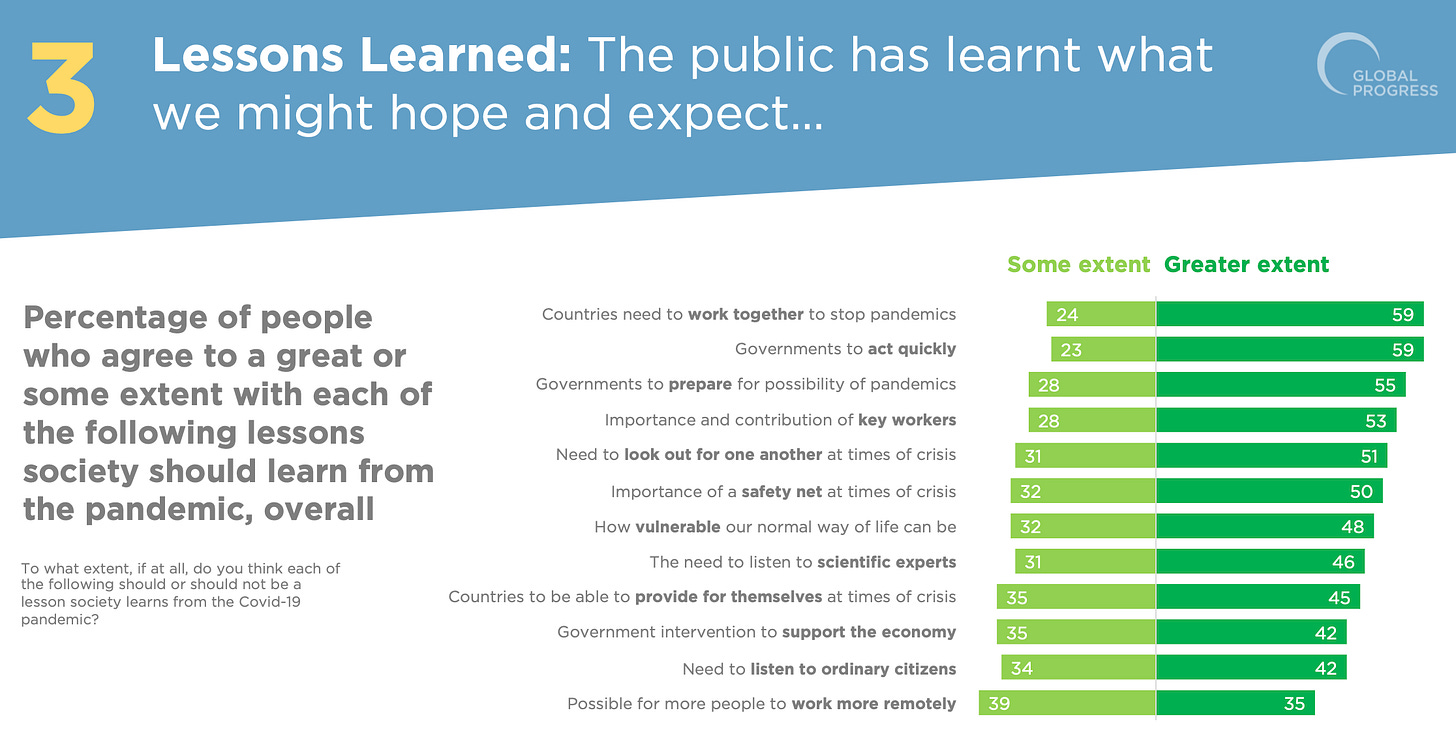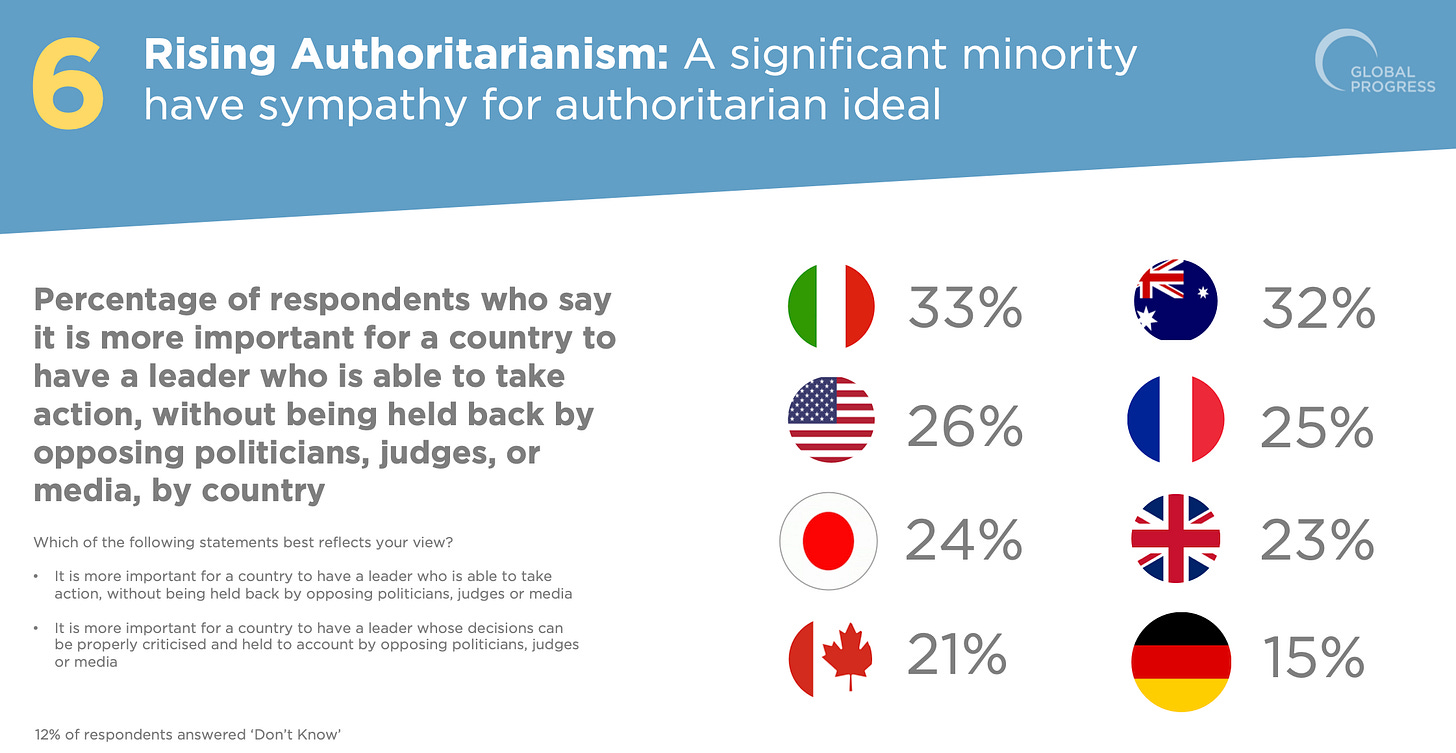Citizens in G7 Nations Want Fast Action on Economic Recovery and Rebuilding
New Global Progress/YouGov poll shows importance of national preparedness and international cooperation, plus rising concern about free speech, particularly in the US.
Ahead of the 47th G7 summit in Cornwall from June 11-13, 2021, new multi-nation polling from Global Progress and YouGov provides a wealth of useful data on what citizens in the world’s leading economies think about economic recovery and politics post-pandemic.
The study interviewed a total of 11,433 adults in nationally representative samples in the United States, the United Kingdom, Germany, France, Australia (also invited to summit), Italy, Canada, and Japan. I was fortunate to be able to work on the design of the study along with Matt Browne, Alex Schmitt, and Hans Anker at Global Progress and Marcus Roberts and Sophy Hinchcliffe at YouGov.
Major findings from the research include:
1. In the wake of the coronavirus pandemic, citizens have learned important lessons about their own societies and the need to address critical problems both at home and globally.
The study presented respondents with a list of items and asked them, “To what extent, if at all, do you think each of the following should or should not be a lesson society learns from the Covid-19 pandemic?” Topping the list are lessons learned about countries needing to work together more closely to stop pandemics and national governments better preparing for future pandemics.
This makes sense given people’s fears about future pandemics: roughly 6 in 10 citizens across all 8 nations believe that it is likely that another pandemic on the scale of Covid-19 will happen in the next ten years.
Additional lessons learned include the need for governments to act quickly to confront health and economic crises, and the importance of the social safety net and the key role essential workers play in our societies. Citizens also want their countries to be able to provide more for themselves during crises and to recognize how vulnerable our normal way of life is these days.
2. Citizens across G7 nations (+ Australia) want to see their economies, jobs, and incomes recover as QUICKLY as possible.
Presented with three options about a quicker, greener, or fairer recovery, a plurality of voters in 7 of the 8 nations polled said the main priority for governments should be acting as quickly as possible to ensure jobs and incomes get back to full strength, chosen by 37 percent of adults across all nations polled.
Preference for quick action over other priorities is highest in Italy (50 percent), the United States (42 percent), and Australia (42 percent). Preference for a fairer recovery is highest in the UK (35 percent) and preference for a greener recovery is highest in Germany (30 percent).
Although these three goals need not be in conflict, the desire for fast action to restore jobs and wages underpins voters’ willingness to do more domestically and globally to get economies back on track post-pandemic.
3. Citizens slightly favor governments doing whatever it takes to ensure recovery and strongly favor higher taxes on multinational companies and the wealthy to help finance these efforts.
By a 41 percent to 38 percent margin across all 8 nations, citizens believe their “government should spend whatever it takes to help people and businesses through the economic recovery, even if that means borrowing more money” over the alternative that, “government should be careful how much it borrows and how much debt it builds up, even if that means less money to support people or businesses through the economic recovery.”
The desire for spending whatever it takes over watching debt is higher among voters in Italy (51 percent to 38 percent), Australia (44 percent to 39 percent), Germany (42 percent to 36 percent), and Japan (40 to 26 percent), and is lower in the United States (35 percent to 42 percent) and Canada (split evenly at 38 percent).
Importantly given G7 discussions about a global corporate tax regime, strong majorities of citizens across all 8 nations believe it is fair to raise taxes on multinational corporations and the wealthy to help pay for recovery, but believe it is unfair to do so on small businesses and people on average incomes.
4. Citizens believe it will be economically beneficial for their nations to get a jump on clean energy technology, but worry about the negative impact of artificial intelligence.
Although many people across these 8 nations express skepticism about the ability of the world community to make meaningful progress on fighting climate change, they mostly believe their own nations will be better off economically by taking early action on climate and getting a jump on emerging technologies. Overall, 42 percent of citizens feel it is economically beneficial to get a jump start on climate technologies, with perceived benefits higher than average in Italy (55 percent), Australia (49 percent), and France (46 percent), and lower than average in the United States (40 percent), Japan (36 percent), and Germany (35 percent).
In contrast, few people surveyed in these nations perceive positive effects from rising artificial intelligence and other technological innovations. By a 49 percent to 19 percent margin, people across all 8 countries say these technologies will have a negative impact on the availability of jobs. Likewise, by a 38 percent to 19 percent margin, people also perceive negative over positive impacts on the amount of money people will earn from AI and emerging technologies.
5. Citizens across leading economies view China as a serious threat and rising power.
Most citizens across all 8 nations (53 percent) feel that China’s position in world affairs poses more of a threat than an opportunity to their own country. Perceptions of China as a threat are greatest in Australia (65 percent) and Japan (63 percent), and lower in Italy (44 percent) and Germany (45 percent). China is not seen as more of an opportunity than a threat to people in any of the 8 nations.
Interestingly, Russia also stands out as more of threat than an opportunity to people in the United Kingdom (59 percent) and the United States (53 percent).
6. Roughly one-fifth to one-third of populations in developed countries back authoritarian rule over democratic accountability.
The study presented respondents with two competing statements about democracy and asked them which one comes closer to their own view. Around one-quarter of people across all 8 nations back a strong-man model of governance: “It is more important for a country to have a leader who is able to take action, without being held back by opposing politicians, judges or media.” Conversely, 54 percent of citizens across all 8 nations back a more democratic ideal: “It is more important for a country to have a leader whose decisions can be properly criticized and held to account by opposing politicians, judges or media.”
Support for the authoritarian model ranges from a low of 15 percent in Germany to a high of 33 percent in Italy. Around of quarter of citizens in the United States, Japan, France, and the UK back a strong-man theory of government.
7. A plurality of Americans feel they must watch what they say about politics for fear of being called out or publicly targeted for their views.
Citizens in most countries feel that they are generally free to speak about politics without fear of being attacked for their views. But the percentages are not that high anywhere. Majorities of citizens say they are free to speak about politics without fear of retribution only in Australia (55 percent) and Italy (54 percent).
Notably, the United States stands out as a real outlier on this front: a plurality of Americans (40 percent) say that they must watch what they say or think about politics for fear of being called out or targeted.
8. A Biden-style investment agenda garners strong support among citizens in G7 nations (+ Australia).
The study presented people with the following overview of President Biden’s approach to recovery and asked whether they would support or oppose similar measures in their country (slightly different wording used in the US):
President Biden has said he will spend $2 trillion on infrastructure, health care, renewable energy, paid in large part by a tax on corporate profits, with an aim to make the US economy more environmentally friendly, fairer and more globally competitive. To what extent would you support or oppose your country's government following a similar approach?
Two-thirds of citizens in Canada and Australia—and more than 7 in 10 people in France, Germany, the UK, and Italy—say they would support such investments in their own countries. Support is lowest in the United States itself, at 55 percent, driven by emerging opposition from Republicans.
The Global Progress/YouGov study presents a clear challenge for many center-left parties. Citizens across these nations say they want more concentrated, effective, and cooperative actions to help people, restore domestic economies, and prepare better for future calamities in the wake of the pandemic. But they remain divided politically and culturally on who should lead these efforts and how they should be carried out.
This will be particularly hard given widespread social distrust across industrialized societies: 62 percent of citizens across all 8 nations believe that you can’t be too careful in dealing with other people compared to less than 3 in 10 who say that most people can be trusted.
The sweet spot electorally then will be occupied by parties and leaders who can combine the desire for swift and thorough economic action with consensus values and a unifying style necessary to guide internally divided populations forward.












